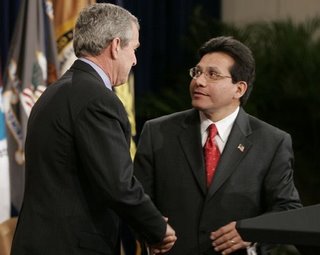US Attorney General Alberto Gonzales is currently in
Israel, where I had the chance to attend a lecture he delivered at
Tel Aviv University on “Global Law Enforcement after 9/11.” Sponsored by the
Jaffee Center for Strategic Studies, and by the Faculty of Law, the talk was introduced by both the president of the university and the rector of the law faculty. The audience was made up of scholars, students, and of course, the American ambassador to
Israel, Richard Jones, as well as a number of embassy staffers.
Strangely enough, Gonzales spent the larger part of his lecture talking about international cooperation in the realm of traditional law enforcement, singling out such crimes as human trafficking, child pornography, corruption, trade in illegal drugs, and intellectual property violations, and the multilateral approaches to them. He even cited the case of Ze’ev Rosenstein, the Israeli crime boss recently extradited to the US for his involvement in a sophisticated ecstasy ring. Going out of his way to praise multilateral approaches on the criminal front, Gonzales seemed to be avoiding the controversies around his particular juridical innovations in the post-9/11 era. This became abundantly clear during question period.
The critics in the audience were not deterred by rector Zvi Shtauber’s warm welcoming words to Gonzales - “the atmosphere here is very warm toward you and to President Bush” – nor by the Attorney General’s praise for “this wonderful little country.”
One of the first issues raised was Guantanamo. An audience member asked for how long the US planned to maintain the current situation, where detainees are denied access to a lawyer and held without charges. The Attorney General’s response was inauspiciously weak. Gonzales repeated several times that “people have a lot of misinformation about Guantanamo,” without doing anything to engage the question before him. Then, as a further defense, he explained that some countries did not want to repatriate detainees whom the US was willing to release. To illustrate this, Gonzales chose an example that actually did not fit the case: he told the audience that China had wanted some detainees who were Chinese citizens, but that the US refused to release them because they were sure to be tortured in their home country. Coming from one of the individuals who signed off on the infamous “torture memorandum,” this is bizarre, to say the least.
More disconcerting was Gonzales’s recurring invocation of the “poppa knows best” model. Even after Abu Ghraib, as well as the numerous smaller-scale improprieties, the Attorney General seemed to insist that the administration would do what is right, even without the usual legal procedures that one would associate with due process of the law. Thus, in response to an audience member who asked whether there were any US courts to which Guantanamo detainees could appeal, Gonzales recycled a slogan that critics who believe that the administration operates without any checks are simply wrong.
At the same time, Gonzales continued to pay lip service to the importance of protecting civil liberties, insisting that it was possible to respect basic human dignities as well as to protect one’s country. In the same breath, he asked whether the Geneva Conventions “still play the same role as before” in the post-9/11 era. Somewhat cavalierly, he answered his rhetorical question, with the words that they were “still important.”
See also the coverage in the
Jerusalem Post and the
Daily Telegraph.
 President Bush Swears in Gonzales as A-G (White House)
President Bush Swears in Gonzales as A-G (White House)
1 comment:
That sounds like an interesting opportunity to hear A-Gon (as we like to call him) speak. I'm not at all surprised by the total indirectness with which he approached every uncomfortable question. It's really been standard affair here in the US for the past five years, and no doubt will continue for at least another two and a half.
Are some Israeli politicians similar? Do they skirt the questions to avoid inconvenient truthes?
Post a Comment